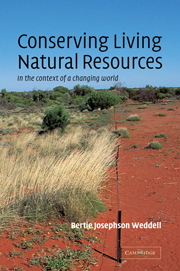Book contents
- Frontmatter
- Contents
- Preface
- Introduction: Balance and flux
- Methodology: Getting the information we need to manage living natural resources
- Part I Management to maximize production of featured species – a utilitarian approach to conservation
- Part II Protection and restoration of populations and habitats – a preservationist approach to conservation
- Part III Management to maintain processes and structures – a sustainable-ecosystem approach to conservation
- Postscript
- Appendix: Scientific names of organisms mentioned in the text
- Index
Preface
Published online by Cambridge University Press: 05 June 2012
- Frontmatter
- Contents
- Preface
- Introduction: Balance and flux
- Methodology: Getting the information we need to manage living natural resources
- Part I Management to maximize production of featured species – a utilitarian approach to conservation
- Part II Protection and restoration of populations and habitats – a preservationist approach to conservation
- Part III Management to maintain processes and structures – a sustainable-ecosystem approach to conservation
- Postscript
- Appendix: Scientific names of organisms mentioned in the text
- Index
Summary
I wrote this book to introduce students to and to review for managers three different approaches to natural resource management. Until the early 1970s, college courses and texts in natural resource management dealt primarily with a utilitarian approach to resources, with a little preservationist management thrown in (for example, the story of Yellowstone National Park and parks in general). Then endangered species and nongame species began to attract the attention of managers. During this period, a number of ecologists in North America also undertook studies of ecosystem functions and processes. (In Europe ecosystem studies had been receiving attention since late in the nineteenth century.) By the 1980s, courses and texts in conservation biology began to appear. At first these emphasized the management of small, fragmented populations; later, management to maintain fundamental ecosystem processes became a more prominent theme.
I wanted to present these different strands of thought to students who were not necessarily majoring in the natural sciences or in management and to show how these threads interweave in the fabric of natural resource management. This book attempts to do that, by presenting the historical and conceptual contexts of different approaches to resource management. It begins with the utilitarian approach to harvesting featured species, proceeds to recent responses to the biodiversity crisis, and culminates in efforts to manage ecosystems sustainably.
- Type
- Chapter
- Information
- Conserving Living Natural ResourcesIn the Context of a Changing World, pp. xi - xviPublisher: Cambridge University PressPrint publication year: 2002



